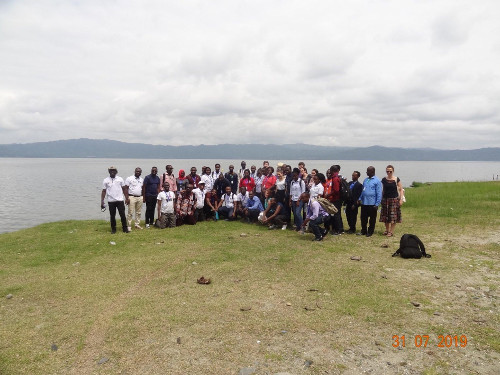African SWIFT and YESS International Summer School 2019
Andreas Fink and Peter Knippertz have been invited to teach at this two-week Summer School on Tropical Meteorology over West and East Africa taking place at Kwame Nkrumah University of Science and Technology (KNUST) in Kumasi, Ghana, from 21 July – 2 August 2019.
The KNUST has hosted a third meteorological summer school in the last 11 years. Based on very positive experiences as lecturers at the two Ewiem Nimdie Summer Schools at KNUST in 2008 and 2010 (see Tompkins et al. 2012), Peter Knippertz and Andreas Fink volunteered to lecture again at this year’s SWIFT and YESS Summer School for one
non-overlapping week, respectively. Due to the funding support from the SWIFT project coordinated by the University of Leeds (UK), the major thematic focus this time was on weather prediction at time scales from a few days to seasonal.
Every day started with a weather discussion presented by forecasters from Africa. The weather analyses and forecasts were based on the African Synthetic Analysis and Forecast (WASA/F) approach outlined in the first Forecasters' Handbook for West Africa (see Cornforth et al. 2019) to which Peter K. and Andreas F. contributed substantially. WASA/F is based on a synthetic map containing main features of the West African monsoon like jets, African Easterly Waves (AEW), Mesoscale Convective Systems (MCSs), etc. Due to the poor forecast skill of MCSs-related rainfall in West Africa, the approach helps, for example, to forecast the initiation and life cycle of MCSs based on the more predictable locations of AEW troughs and the locations of high low-level shear and CAPE zones. The WASA/F approach helped the forecasters in improving their comprehension of the actual weather situation and to communicate better forecast when compared to the weather discussions at the two earlier summer schools.
There was a good mix of African and non-African lecturers, the bulk of the students and forecasters (about 80%), however, came from Africa. Peter K. and Andreas F. gave lectures and trainings on West African weather systems and
the use of data from ground and upper-air observing networks. There were intensive discussion and interactions between the African Early Career Scientists who took the opportunity to discuss their research with senior scientists in their field. It was more than worthwhile to lecture at the SWIFT and YESS summer school, and Peter K. and Andreas F. learned many new aspects of the West and East African meteorology, some of which will be helpful for the project C2.
 Participants of the SWIFT-YESS summer school during a field excursion to Lake Bosumtwi near Kumasi, Ghana. The lake is one of the youngest meteorite impact crater on Earth and the lake level allows paleo-climate reconstructions. The lake level had fallen substantially since 2008 also indicating a current drying at the West African Guinea coast. Photo: A. H. Fink.
Participants of the SWIFT-YESS summer school during a field excursion to Lake Bosumtwi near Kumasi, Ghana. The lake is one of the youngest meteorite impact crater on Earth and the lake level allows paleo-climate reconstructions. The lake level had fallen substantially since 2008 also indicating a current drying at the West African Guinea coast. Photo: A. H. Fink.
For more information about this summer school, click here.

